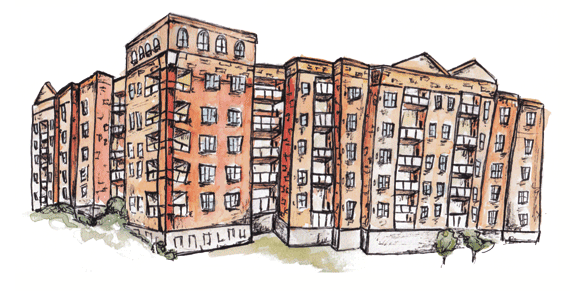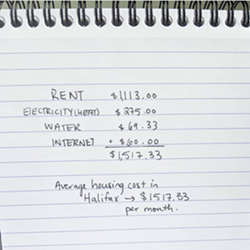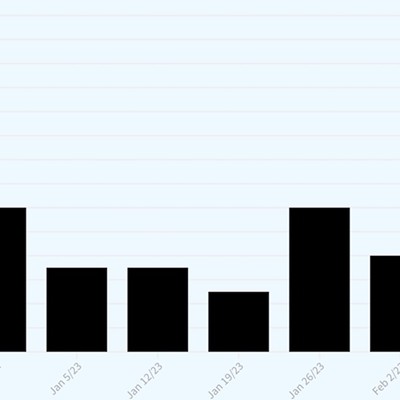Last week, in an attempt to alleviate some of that stress, Premier Stephen McNeil announced a moratorium on COVID-related evictions. The ban states that for the next three months, no tenant can be evicted because their income has been affected by COVID-19.
But, he said Monday, “To those of us in this province who can afford to pay your rent, pay your rent please, on time.”
For tenants who can’t because of COVID-19—including students or those already on EI facing a dismal job market—McNeil encourages them to deal directly with their landlord: “We expect landlords to work with those tenants to see their way through this.”
For the 53 percent of Canadians who are living paycheque to paycheque, or the 34 percent of Canadians who don’t have an emergency fund, the stress of rent-cheque day is hard enough to swallow in its own right—and a rental housing market with a one-percent vacancy rate had renters feeling the squeeze even before COVID-19 hit.
The average rent in Halifax is $1,113. The average monthly Halifax Water bill is $69.33. Last year, the average NS Power bill for Nova Scotians who use electricity to heat their home was $550 on April 1st. Power bills are delivered bi-monthly, so that's $275 a month. Add internet (~$60) plus $641.08 on food per household (based on the average monthly food expenditures in Nova Scotia in 2017 in Canada’s Survey of Household Spending) and we’re looking at baseline monthly living expenses of $2,158.41.
Now factor in the coronavirus. If someone lost their job in March due to COVID-19 and was able to get their EI application approved lickety-split, they’d be looking at a maximum of $2,292 a month. At the other end, if they were working full time making minimum wage before being laid off, they’ll be getting about $1,012 a month.
The CERB, when it’s ready in a couple of weeks, will give Canadians who don’t qualify for EI (or those whose EI will be less than the CERB) $2,000 a month.
Best-case, Haligonians will have just enough at the end of a month for rent and groceries and other necessities.
Worst-case, there won't be enough.
To help, Nova Scotia Power and Halifax Water are both offering bill deferral—meaning if you can’t pay your bills because of COVID-19-related job loss, you can pay them later. You'll definitely still have to pay them eventually.
“We're kind of counting on people to self-regulate," says District 8 councillor Waye Mason. "Just because you can decide to not pay your Halifax Water or your Nova Scotia Power or your tax bill, doesn't mean that's the wisest thing.”
To date, 840,000 Canadians have signed a petition calling for governments to pause rent payments, voicing their support for a campaign to bring awareness to the tough reality renters and people with no or low access to decent housing face in a landlord’s rental market. (In The Coast’s housing survey last summer, 41 percent of respondents said they were paying more than they’d budgeted for their apartment.)
The campaign was created by ACORN—the Association of Community Organizations for Reform Now—an independent national organization of low- and moderate-income families. The Halifax organizer for ACORN NS, Sydnee Blum, says the province’s eviction ban and the federal government’s CERB benefit are a “bandaid solution” for the larger question many renters face: "Do I put the majority of this money towards keeping a roof over my head, or do I buy the things that I need, like my daily necessities?”
The threat of not getting rent money has many small-scale landlords worried. The loss of jobs and job security has many of the 40 percent of HRM households that rent worried. Add the cloud of student loans and credit card debt (73.2 percent of Canadians had some type of outstanding debt or used a payday loan in 2019) and things aren’t looking good.
Councilor Mason says, “Somehow all of the support from all three orders of government and all the utility companies and all of civil society has to add up to: everybody stays in their homes, doesn't have to worry about having a roof over their head, or being able to feed themselves and their family.”
Things your landlord can do in Nova Scotia
(a non-exhaustive list)
• Put your rent up whatever amount they like—as long as they give you notice, in writing, four months before the date of lease renewal (for year-to-year and month-to-month leases).
Things your landlord can’t do in Nova Scotia
(also non-exhaustive)
• Kick you out if you can’t pay rent due to COVID-19.
• Ask you for private health information, AKA force you to prove that you’re sick.
• Deny your request to go month-to-month on a lease after 12 months have passed—as long as you make that request in writing at least three months in advance of the lease renewal. (If you signed a lease for September 1, 2019, and want to go month-to-month starting September 1, 2020, you have to tell your landlord by June 1, 2020.)
Come back here or check with NS public health for the latest reliable updates. In the meantime, wash your hands, cover your cough, wipe commonly used surfaces and stay home if you feel sick.














